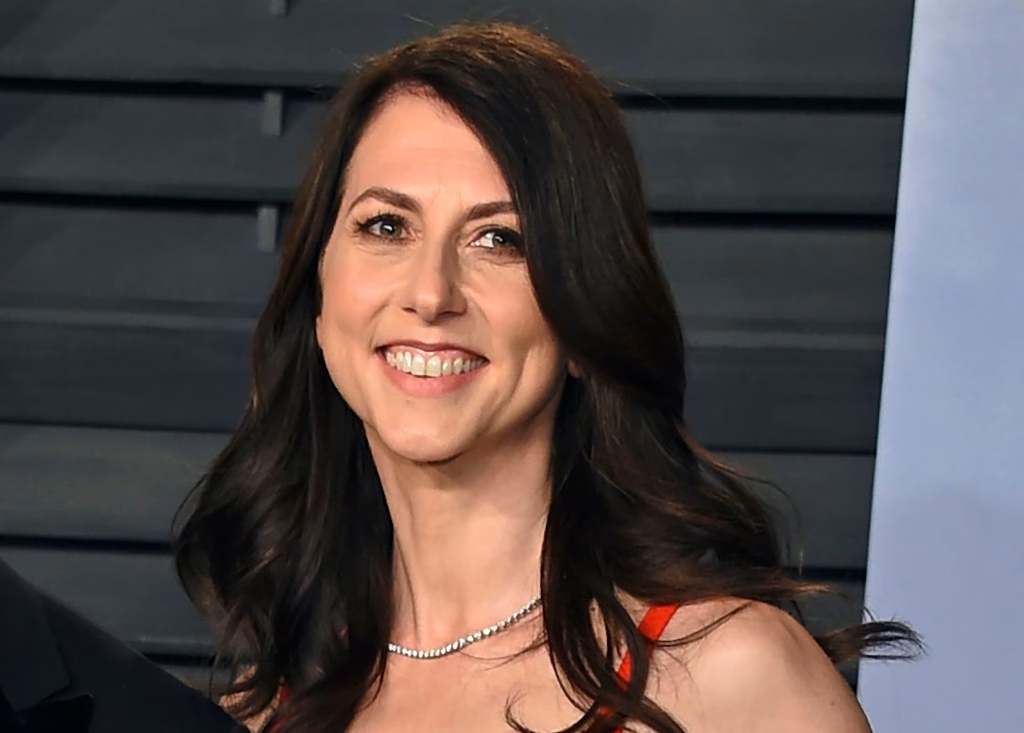MacKenzie Scott’s $19B Donations: Transforming Nonprofits and Making a Global Impact.
MacKenzie Scott, the ex-wife of Amazon founder Jeff Bezos, has revolutionized philanthropy over the past five years with her remarkable $19 billion in unrestricted donations to over 2,000 nonprofit organizations.
Scott’s generosity has reshaped the charitable landscape by providing vital funding to causes that range from racial equity and social justice to LGBTQ+ rights and healthcare, according to recent research from the Center for Effective Philanthropy (CEP).
Unprecedented Donations with No Strings Attached
Scott, who received her wealth through her divorce settlement with Bezos, has made it a priority to empower nonprofits by giving them autonomy. Unlike traditional donations with restricted guidelines.
Latest: Jeff Bezos Awards $50 Million Grants to Eva Longoria and Admiral Bill McRaven
Scott’s gifts, which average $5 million, come with no strings attached. This unique approach has given organizations the flexibility to direct the funds toward their most pressing needs, rather than being constrained by specific donor requirements.
According to the CEP report, these unrestricted donations have had a transformative effect on the operations and impact of nonprofits.
The study, which surveyed over 800 organizations that received Scott’s support, revealed that these donations have played a pivotal role in driving significant change. Elisha Smith Arrillaga, Vice President of Research at CEP, emphasized that Scott’s gifts have been strategically managed by the nonprofits, positively impacting countless individuals across the globe.
Quiet Research: A Discreet Vetting Process
One key aspect of Scott's philanthropic approach is the "quiet research" process she employs to select organizations for donations.
Rather than accepting unsolicited requests, Scott conducts an in-depth, discreet vetting of nonprofits, ensuring that funds are distributed to those organizations that align with her vision.
This process has kept the identity of many recipients out of the public eye, allowing them to focus on their missions without the distraction of media attention.
Latest: Jeff Bezos' Washington Post Pulls $115,000 'Fire Elon Musk' Ad Amid Growing Ties to Trump
Scott’s method of philanthropy has set her apart from many other high-profile billionaires, particularly in the tech sector.
Her practice stands in stark contrast to that of Elon Musk, the Tesla co-founder, who has drawn attention for his donations to political causes and support for President Donald Trump’s election campaign.
Scott’s approach to charitable giving, which is largely focused on systemic issues such as social justice and racial equity, has earned her widespread admiration and respect.
Scott’s Strategic Giving and Future Impact
Scott, whose net worth stands at an impressive $32.2 billion with a 4% stake in Amazon, channels her donations through her organization, Yield Giving. Since 2019, she has focused on making direct, unrestricted gifts to organizations that are working on the frontlines of crucial social issues.
Notable recipients of Scott's funding include groups focused on racial justice, poverty alleviation, LGBTQ+ rights, and support for immigrants and refugees.
Her work has been instrumental in empowering nonprofits with the resources they need to carry out their missions without the usual restrictions that come with traditional philanthropy.
Though Scott's philanthropic approach has been widely praised, some critics, such as Elon Musk, have voiced concerns about her methods.
Latest: What Are Jeff Bezos' Biggest Fears?
Musk has expressed reservations about the scale of Scott’s donations, suggesting that they may not be the most effective means of addressing social issues.
Nonetheless, the long-term impact of her giving has already been felt in numerous communities, with many organizations reporting enhanced programmatic success and the ability to reach more people than ever before.
A Wider Look: The Role of Philanthropy in the Modern Age
Philanthropy has evolved significantly over the past few decades, with major tech billionaires like Scott, Bezos, and Musk redefining what it means to give.
In particular, Scott’s model of unrestricted donations has sparked conversations about the need for greater flexibility in charitable giving.
Traditionally, many nonprofits have relied on funds tied to specific projects, which often limited their ability to adapt to changing circumstances or address unforeseen challenges.
Scott’s approach challenges that model, proposing a more fluid way to empower organizations to make decisions based on their own needs and priorities.
The historical context of modern philanthropy shows a shift from donor-driven models to more trust-based approaches. In the 20th century, philanthropists often imposed strict conditions on the funds they donated, closely dictating how those resources were used.
Today, Scott’s strategy, which places trust in the nonprofit sector to determine how to allocate funds, has sparked a broader discussion about the evolution of charitable giving. The future of philanthropy may very well lie in this more flexible model, one that allows organizations to respond rapidly to global challenges without the burden of restrictive rules.
MacKenzie Scott’s groundbreaking approach could pave the way for future generations of philanthropists to adopt similar strategies, creating a more autonomous and responsive nonprofit sector.
As global challenges continue to grow, Scott's impact on the charitable landscape will likely inspire others to take bolder steps in addressing the needs of marginalized communities around the world.
Scott’s Legacy of Transformation
MacKenzie Scott’s $19 billion donation effort has forever changed the nonprofit landscape.
Her commitment to unrestricted giving and quiet research ensures that the funds go exactly where they are most needed, allowing organizations to flourish without the constraints of conventional philanthropy. With the potential to reshape the future of charitable giving,
Scott’s philanthropic vision will likely leave a lasting legacy, influencing how future philanthropists approach their contributions.
As we look ahead, it is clear that Scott’s model is only the beginning of a broader shift toward more flexible and effective charitable giving, one that places trust in the hands of the nonprofit sector to create lasting change.





















